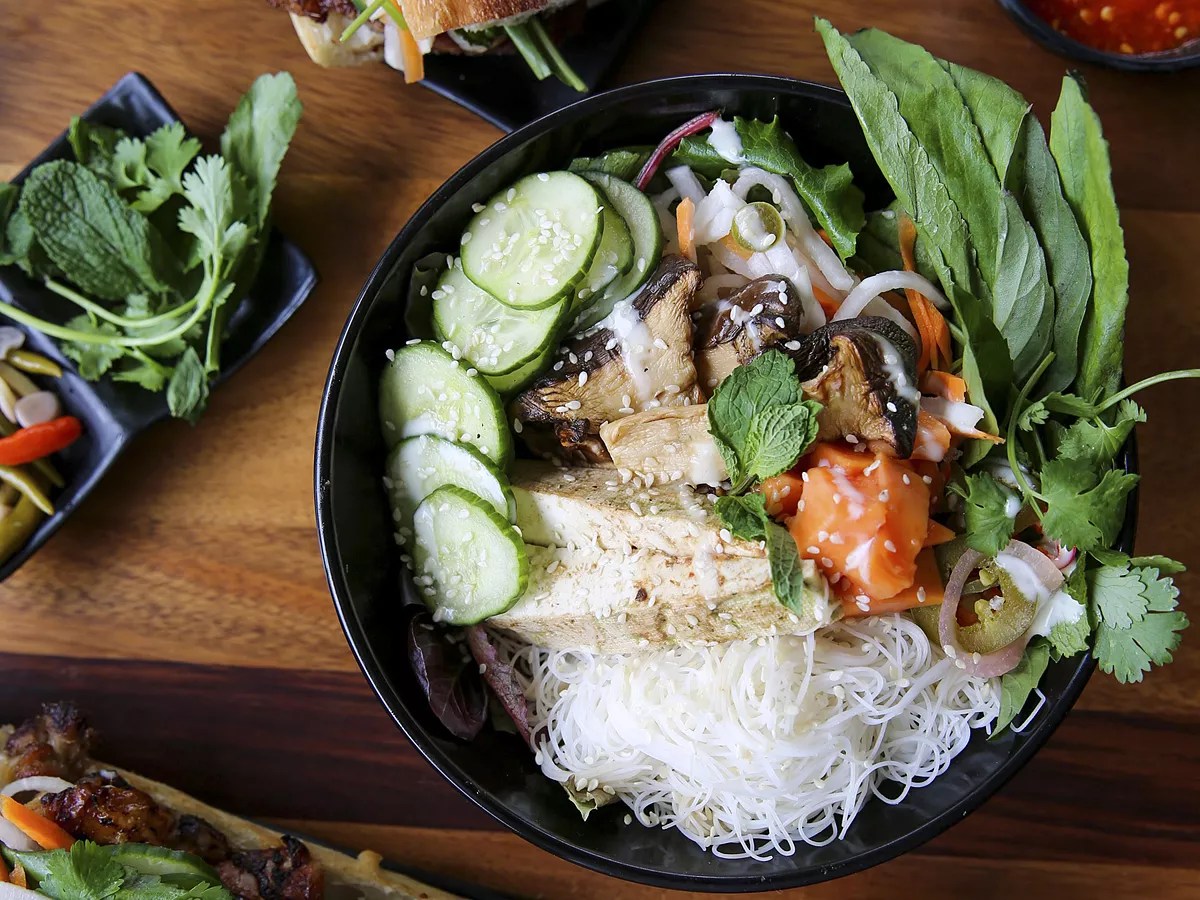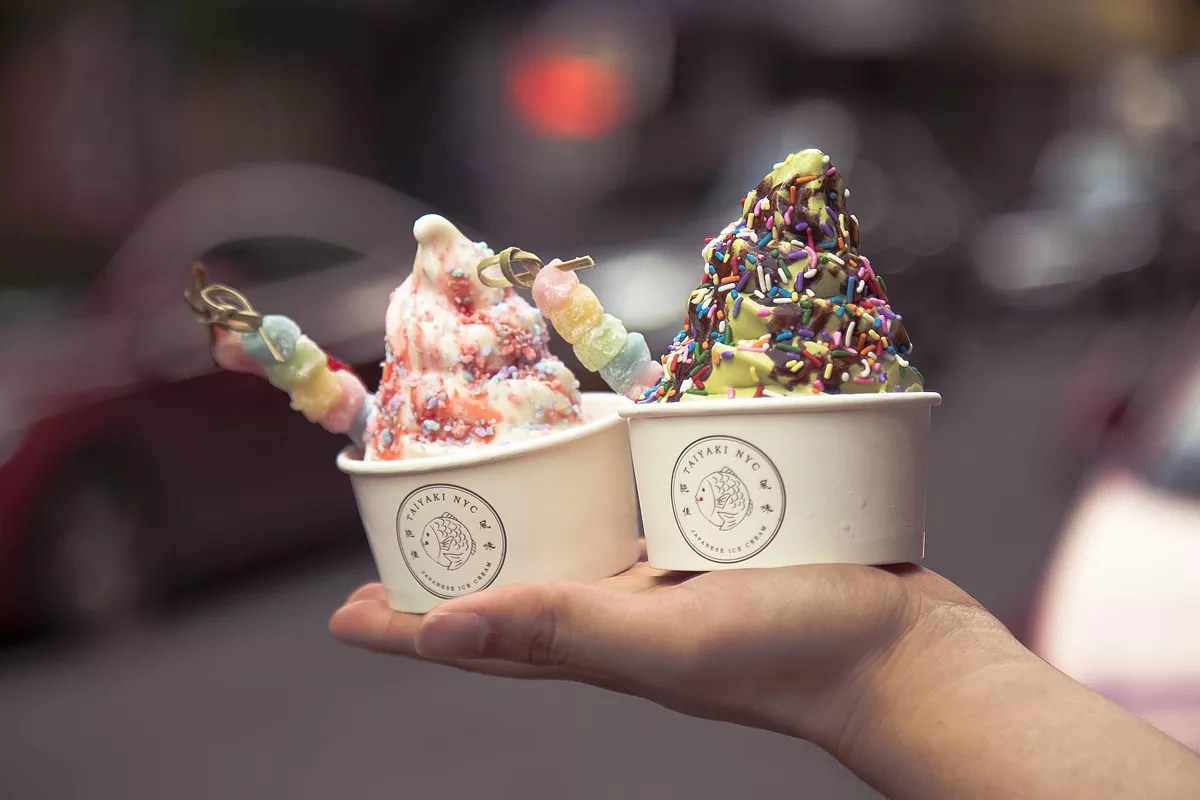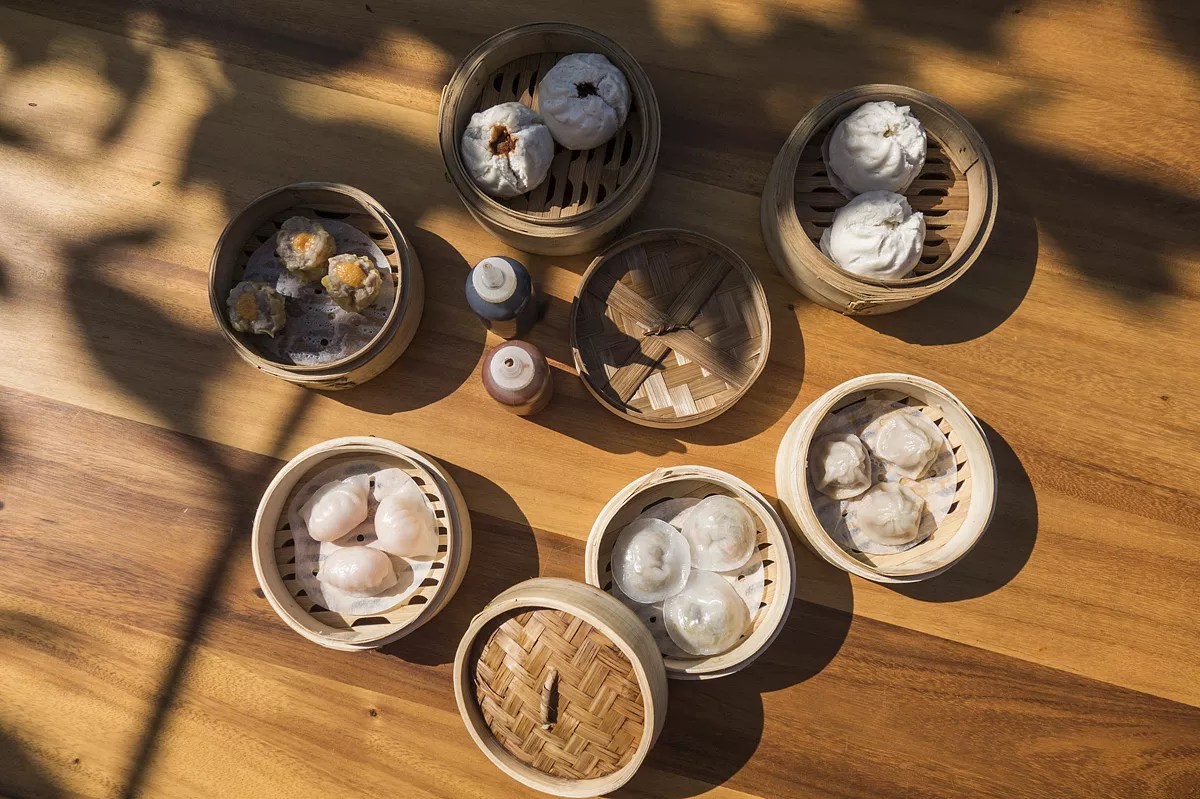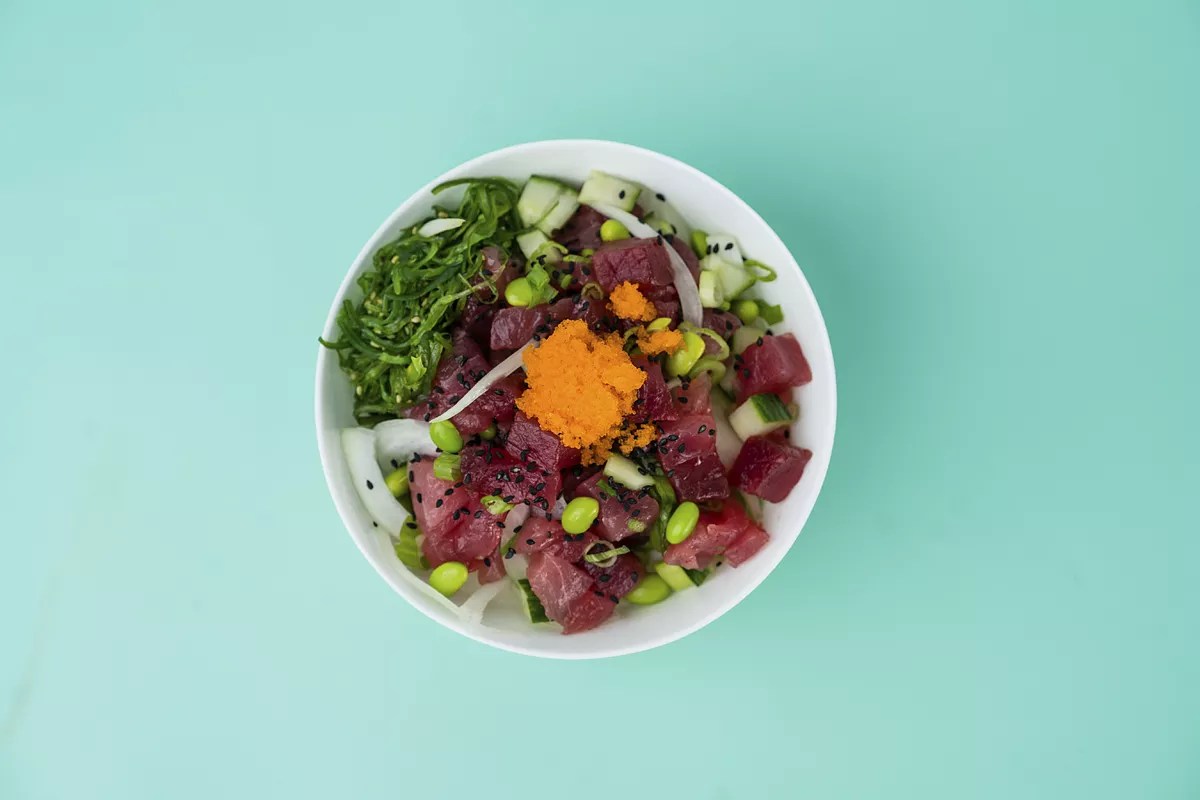
Photo by Katie June Burton

Audio By Carbonatix
It’s a soggy Sunday evening, and Wynwood’s streets are empty except for a few brave souls rushing to or from their cars. But 1-800-Lucky (143 NW 23rd St., Miami) is filled with people, some of whom are hanging out at the bar to escape the rain-filled patio. Outside, the DJ plays ’90s dancehall as customers line up, umbrellas touching, at a window where Instagram-famous ice cream is being served in fish-shaped cones.
Since opening in November 2017, this 10,000-square-foot mix of seven restaurants, two bars, a karaoke room, and a small convenience store/record shop has drawn crowds unseen until recently even in Wynwood, the city’s trendiest food and culture hub.
The place, just a few steps off NW Second Avenue, is the first of a collection of food halls slated to open this year, including La Centrale and Casa Tua at Brickell City Centre, St. Roch Market in the Design District, and Treats Food Hall inside Aventura Mall.
The idea for an Asian food hall in Miami – a city not exactly known for its Asian population or cuisine – was born two years ago when Sven Vogtland and Alan Drummond, partners at Wynwood juggernaut Coyo Taco, along with Gaby Chiriboga, a hospitality veteran and longtime friend of Drummond’s, pondered opening a ramen shop.
The seven food concepts have one-year leases, with each space built to suit.
That plan grew in ambition when they found the then-vacant building and adjoining lot on NW 23rd Street just a few blocks from Coyo Taco. The building still had signage from its previous tenant, a modeling agency called Latin Angels, but the partners saw potential in the patio, Vogtland says. “We saw many spots, but we kept coming back to this one because it was such a beautiful space.”
Vogtland and Drummond kept the project quiet for some time, just as they had done with Coyo, which debuted in December 2014. Before the debut of that reasonably priced indoor/outdoor taco restaurant, there was no big media event or advance hype. Rather, Drummond says, “We just had a lady making tortillas to tease people. We like to keep things a mystery.”
Since then, Coyo has made a name by offering simple food in an efficient and fun atmosphere to a generally young crowd. A back bar featuring DJs became a hit too, and the restaurant recently expanded into Brickell, with plans to open in Palm Beach and Panama in coming months.

Taiyaki NYC
Photo by David Paul Larson
Although it shares DNA with Coyo’s business model, 1-800-Lucky was a much more formidable project. The partners own the business and operate the common areas, bar, and shop in front. They are also responsible for the karaoke room and entertainment. The seven food concepts have one-year leases, with each space built to suit. A prep kitchen is shared by all.
Vogtland and Drummond curated the eateries. They visited New York City and Los Angeles, found restaurants they liked, and invited the owners, most of whom never had Miami in their expansion plans, to see Wynwood for themselves. “We took them to Coyo, walked them through the space here, and showed them our vision,” Vogtland says.
Lotus + Cleaver’s Doron Wong is one of those who was wooed by the pair. The chef, who has a long pedigree at New York restaurants such as Yunnan Kitchen, is scheduled to cook at Manhattan’s James Beard House in March as part of the Asian Food Mafia, a group of young New York chefs committed to elevating the perception of that region’s cuisine.
He visited Miami this past summer with business partner Erika Chow. “We were sent down to look at the project,” he says. “We were sold almost immediately.” Wong found that Wynwood exuded the same energy as Williamsburg, a Brooklyn neighborhood filled with creatives. The chef had never thought of expanding to South Florida. But the idea of signing a one-year lease reduced the financial risk. “Honestly, if this setup wasn’t the way it is,” he says, “I wouldn’t be in Miami.”
At Lotus + Cleaver, he offers one of the concept’s most expensive dishes : a whole Peking duck accompanied by steamed buns, scallions, sweet apple bean paste, and dipping cane sugar for $55. Pay an additional $18 for seared foie gras. If an entire duck, which feeds about four people, is too much, diners can order twin Peking duck buns topped with the luxury duck liver for $17.
He also offers oversize chili-garlic chicken wings with a side of house-made pickles ($9). During one visit, the wings were plump but neither spicy nor flavorful, a rare miss at 1-800-Lucky.

Steamed dim sum
Courtesy of Yip
Japan’s Shimuja, famous for its tonkotsu-style ramen, with a thick broth made from pork and pork bones, has opened under the brand Hayato Miami. The tonkotsu ramen, offered for $15, is a salty and satisfying dish, though it remains to be seen how popular this steaming bowl will be on a sultry summer day in Miami.
New York City’s Myumi, best known for its former omakase food truck at the Wynwood Yard, serves a truncated menu of hand rolls. The selections change daily based on the availability of fish, but offerings start at $6 for a spicy tuna and can soar upward of $18 for toro, the fatty belly meat of a bluefin tuna.
Yip, a concept by Pembroke Pines’ Gold Marquess Fine Chinese Cuisine, serves freshly made dim sum in bamboo steamer baskets. Demand is sometimes higher than the ability to make the dumplings, and on busy days, some choices on the menu sign are covered in tape, signifying they’re sold out. And Anaheim’s Poke OG offers ahi tuna or salmon poke bowls as well as an entire column of vegan bowls subbing out seafood for colorful fruits and vegetables such as watermelon, truffles, and pineapple. A standard bowl with three ounces of fish or veggies starts at $13.50 and gets pricier with add-ons.
Finally, Coyo Taco’s executive chef/partner, Scott Linquist, who showed Miami his culinary chops at his Miami Beach restaurant Olla, is represented with Les Banh Amis, serving charcoal Vietnamese bánh mì sandwiches on Sullivan Street Bakery bread with fillings ranging from meatballs ($11) to head cheese and p’té ($11). Though best known for his Mexican fare, Linquist fell in love with Vietnamese food while traveling in Southeast Asia. The chef frequently mans the small corner booth’s grill, cooking “Vietnamese-style” Proper Sausages and Portuguese sardines.
The longest lines at 1-800-Lucky are reserved for two novelties: the New York-based Taiyaki, which offers exotic ice-cream flavors such as black sesame and green tea in fish-shaped cones for $7 and beer served with an iced head to keep it cold. The food hall is one of only two places in Florida selling the frozen Kirin; the other is Epcot’s Japan Pavilion. The beer is not as flavorful as some craft brews found in the neighborhood, but it’s sure to be found on many an Instagram profile with a catchy hashtag.

Poke OG’s ahi tuna bowl
Photo by Mike Villa Visuals
1-800-Lucky is filled with hungry 9-to-5’ers and families at lunch, tourists in the afternoon, and a mix in the evening. Around 10 p.m., the music gets turned up; then things calm after midnight until the hall closes at 3 a.m.
Whether 1-800-Lucky remains the “it” place in Miami is yet to be seen. Though its partners claim the average check price is about $20, in reality, it can climb much higher. Start with an order of dumplings; add a few hand rolls, a bánh mì sandwich, and a few beers; and you’ll pay closer to $50 for a meal without the traditional trappings of wait service and a guaranteed seat.
Though the fare here is generally unique in Miami, where anything beyond predictable Asian food is rare, you’d need a crystal ball to see whether new eateries will arrive with enough innovative dishes to keep the crowds coming as Miami’s culinary palate evolves. For now, though, 1-800-Lucky’s popularity might be best described by a father watching his daughter, wearing pastel leggings and sweatshirt, devour a unicorn ice-cream cone while ducking out of the rain: It’s harmless fun with instant appeal that could to turn into something deeper with time.